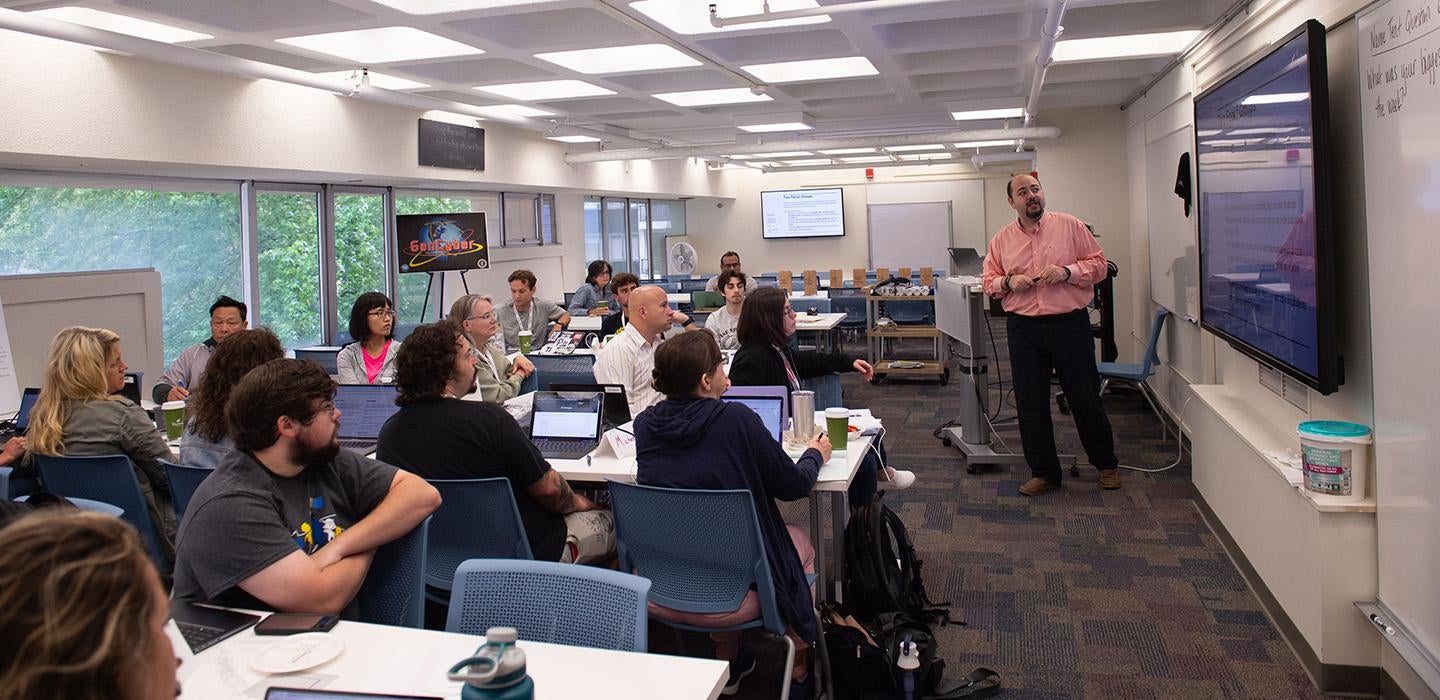
Subscribe to Pittwire Today
Get the most interesting and important stories from the University of Pittsburgh.The word “cybersecurity” might bring to mind images of a hooded hacker, clacking on a keyboard in a dimly lit room while green text flows down a black screen.
That misconception is just one part of a critical lack of knowledge about cybersecurity in the U.S., according to Pitt’s Ahmed Ibrahim.
“85% of high schools don’t teach any kind of cybersecurity at all,” said Ibrahim, a teaching assistant professor in Pitt’s School of Computing and Information. “There’s a huge demand in the industry and a huge demand in the government. And we don’t have enough people to fill that demand.”
Ibrahim is part of an effort to address that shortfall — starting June 19, he and his collaborators ran a weeklong course for high school teachers called GenCyber@Pitt, part of the national GenCyber training program run by the National Security Agency and National Science Foundation.
In it, teachers learned concepts that are important to understanding and intercepting cyber threats in lectures and labs they could bring back into their classrooms.
“They’ve opened our eyes to a lot of what cybersecurity is,” said Susan Dunning, the computer science teacher for Cornell High School in Coraopolis, Pennsylvania. “It makes you hungry for more knowledge so you can give more back to your students.”
Lab exercises during the week made use of advanced instructional tools provided by Pitt Information Science. The Pitt Cyber Range, for instance, allowed the teachers to work in a simulated virtual environment, scoping out cyber threats and experiencing cyberattacks in different situations.
Another popular exercise was a “capture the flag” activity, where participants solved problems of increasing difficulty. “It’s kind of like a virtual escape room. You can compete against other people, and there are competitions across the state and the country,” said Lindsay Kallas, networking technology instructor at Admiral Peary Area Vocational Technical School in Ebensburg, Pennsylvania. “It brings gamification into it.”
Kallas is revamping her class into a digital media and cybersecurity course, and in her week at GenCyber@Pitt, she learned about tools and techniques she plans to bring into the classroom. She also found a collaborator, Jerome Mick of the Clearfield County Career and Technology Center, with whom she plans to start an organization to encourage girls to learn about information technology.
“When I graduated in 2010, I graduated with 19 guys. I was the only girl,” Kallas said. “So, the fact that girls aren’t in the IT profession is something that’s near and dear to my heart.”
Each day of the program had a similar cadence: first was introductory material, then technical hands-on work, with lesson planning and reflection ending the day. Ibrahim was joined by SCI Associate Professor Balaji Palanisamy, who served as lead instructor, and Tamar McPherson, who served as a pedagogical expert. Three Pitt students also helped with the program as tech support, including Conor McGirr, a senior information sciences major who’s considering cybersecurity as a potential career path.
“We’ve already done all these labs before, so we could help lead them in the right direction,” said McGirr. “I learned a lot more respect for high school teachers: They really care about their students.”
Another key element was introducing teachers to cybersecurity professionals working in industry, including at companies like Amazon, UPMC and PPG.
“I don’t think students know the kind of opportunities that lie in cyber,” said Mick. “You don’t have to be a complete and total IT whiz, you can also be the person who writes policies and procedures. There’s a lot of career tracks.”
Ibrahim is hopeful the program will continue in the future, pending continued funding. Speaking on the last day of the program, he emphasized that GenCyber@Pitt wasn’t just a class — it was a bonding experience between people who care deeply about education.
“When I teach during the semester, I’m seeing students two or three times a week,” he said. “In this program, we’re meeting each other for eight or nine hours every day. It feels like a community. I cannot imagine that tomorrow I’m not going to see them.”
Pitt is teaching the students, too
Also last week was Pitt’s Air Force Association CyberCamp, a free weeklong camp open to Pittsburgh-area high school students. The program, which is in its seventh year, aims to get students interested in careers in science, mathematics, engineering and technology (STEM). Around 150 students attended this year’s event, bumping the total number served to more than 1,000.
— Patrick Monahan, photography by Johnathan Wright


